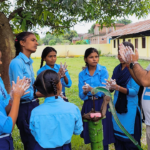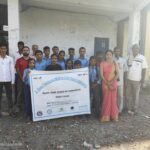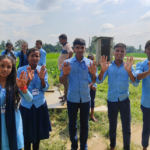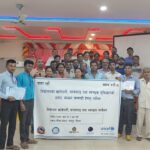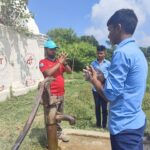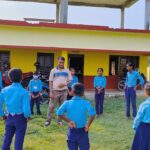Madhesh Province
WASH IN SCHOOLS
Support of the WASH supply

Place
Baragadhi RM & Jeetpursimara SMC,
District Bara
Chandrapur & Yamunamai RM ,
District Rautahat

Who
Chay Ya Nepal,
Baragadhi RM & Jeetpursimara SMC
Chandrapur & Yamunamai RM

Partners
UNICEF

When
2022- 2023

For
11,140 students and 253 teachers at 22 schools

Status
Completed and in operation
Project
The target of this project were 22 schools of Madhesh Province: eight schools from Baragadhi Rural Municipality, four schools from Jeetpursimara Sub-Metropolitan City (both in District Bara), five schools from Chandrapur and five from Yamunamai Rural Municipality (in District Rautahat). Out of the 22 schools, nine are secondary and 13 basic level schools.
During a baseline survey of the schools, all WASH facilities like toilets, urinals, handpumps and hand washing stations were inspected and tested (especially for the water quality). Unfortunately, many were damaged, unusable or non-existent all together. In some schools, only unisex toilets were found, which were not only inconvenient to use but also not sufficient in numbers resulting in toilet queues. Despite being part of the school curriculum, hygiene education was only taught in nine schools, menstrual hygiene in even less.
To improve the situation, the plan was to construct new appropriate WASH facilities where necessary and upgrade or repair the ones available whenever possible to allow equal access to all students. Awareness campaigns and workshops were conducted simultaneously to guarantee the sustainability of the project.
Thus, in all 22 schools safe drinking water facilities and handwashing stations were provided as well as incinerators for pad disposal built (none existed before). Sometimes new bathrooms needed to be constructed, mostly the ones in place could be repaired and/ or upgraded. Also, kitchen gardens were initiated everywhere.
Additionally, action plans for regular maintenance were put in place by appointing and training a responsible team of people, including teachers, caretakers and office staff as well as students. Tool kits, cleaning materials and spare parts were handed out so the schools can take care of simple repairs themselves. Nearly 650 girls and community women took part in workshops on menstrual hygiene and learned how to make their own reusable sanitary pads.
We are delighted that our efforts have also been recognized by the local government and that 13 schools have now received a 3-star rating and nine schools a 2-star rating.


